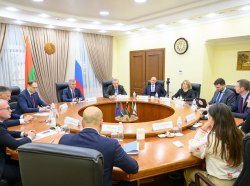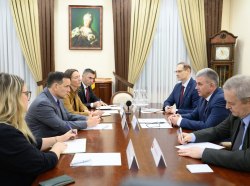Tiraspol, 21 November. /Novosti Pridnestrovya/. The statehood of Pridnestrovie originates from a political disaster known as the collapse of the Soviet Union. However, the foundations of the processes that occurred in our region had been laid long before, President Krasnoselsky noted during the roundtable conference "The political and legal foundations for international recognition of Pridnestrovie's independence."
The president recalled that Moldova had chosen the path of the development of a titular nation, infringing, at the same time, the rights of others. This had caused protests in Pridnestrovie.
"23 June 1990 is a very important date for understanding our statehood. It is the day when the Parliament of Moldova adopted two well-known declarations under pressure from the Popular Front. The first one proclaimed exit from the Soviet Union a year and a half before its collapse, thus depriving us of union citizenship. A question arises in this regard: who are separatists? On the contrary, we were doubly internationalists and struggled for the preservation of a single state. We wanted to live togeather. The second declaration recognised the Molotov-Ribbentrop Pact to be null and void, proclaimed exit from the Moldovan SSR and the illegality of its formation, that is, de jure the Parliament of Moldova abandoned present-day Pridnestrovie. What were we, Pridnestrovians, supposed to do? On 2 September 1990, Pridnestrovians voted for the establishment of the PMSSR at a popular referendum. It was a principled position: if Moldova had quitted the MSSR, then we were the successors of this entity and remained in the USSR for another a year and a half," said the president.
It is after the USSR's collapse that Pridnestrovie proclaimed its independence.
"What did Moldova actually do? A blatant irresponsible legal error, that is, it recognised the MSSR's formation to be illegal, actually abandoning us. But trying to improve the first error, Moldova made another one: it unleashes a war against Pridnestrovie in 1991-1992, killing thousands of people. Thanks to the Russian Federation and its peacekeepers, the war was halted; thousands of lives were saved. No one doubts the uniqueness of the Russia-led peacekeeping operation in Pridnestrovie. No civilian or military man has been killed in hostilities over 25 years of its conduct," noted Krasnoselsky.
According to the president, this peacekeeping format should be studied, and the attacks on Russian peacekeepers and Russia's military components are very dangerous not only for regional peace.
"Even after the tragic events — the collapse of the USSR and 1992 war — Pridnestrovie did not insist on its exclusive independence, seeking forms of coexistence with Moldova. It is we who proposed autonomy in 1993, but we were ignored. The same year the OSCE proposed a federative state. But Moldova ignored the OSCE's initiative as well. A joint constitutional commission was established in 2001 to elaborate a constitution for a single state. And again Moldova disrupted that process. In 2003, Pridnestrovie signed the famous Kozak memorandum agreeing to an asymmetrical federation, but at the very last moment the Moldovan president, Mr Voronin, refused to sign the document. I don't want to blame anyone. These are just historical facts that cannot be deleted from history or forgotten. We, Pridnestrovians, were constantly searching for common forms of living with Moldova, but we were not heard; we were ignored; they didn't want to give us anything. They wanted to turn us into a reservation, and that's what we didn't want," underscored the president.
He added that all mediators and negotiators had actually forced Pridnestrovie to be independent. And the 2006 referendum had proved that.
"Over 25 years of the negotiating process, two generations of citizens have grown up in Pridnestrovie and Moldova — one in Moldova and another in Pridnestrovie — who have never lived together, who knows the states of Pridnestrovie and Moldova. But that's probably not the most important thing. It is important that Moldova and Pridnestrovie have developed its own legal systems in 25 years. Moldova has adopted the Romanian system, and Pridnestrvie the Russian one. These are absolutely different legal systems. So, on the basis of these legal systems, no politician, either Moldovan or Russian, can speak today of a political settlement. Even those politicians who declare political settlement, roughly speaking, violate their own constitution and legislation, which is unacceptable. That is why I'm talking about the unwillingness to engage in political dialogue. Just imagine that a Pridnestrovian president will theoretically sign a document that implies Pridnestrovie's reintegration into Moldova. Upon his return home, he would be prosecuted for abuse of power; he would be impeached in accordance with the constitution; there would be an early election at which a new president will be elected who'll abide by the constitution and legislation," said the president.
According to him, it is not a question of presidents but rather legislation and the opinion of the people who have got accustomed to living separately. That's the most important thing. "The people are the basis of the PMR's independence," said the president.
"I always ask our Moldovan colleagues: if we are not ready to engage in political dialogue today, let's better bring our positions closer on economic, humanitarian and cultural issues. Ordinary people are expecting this. And we are going in this direction. We have recently opened a bridge across the Dniester River, which had been closed for 25 years since the war. We are addressing the issues of telecommunication, licence numbers, railway traffic, schools, joint land use and so on and so forth," added the president.








